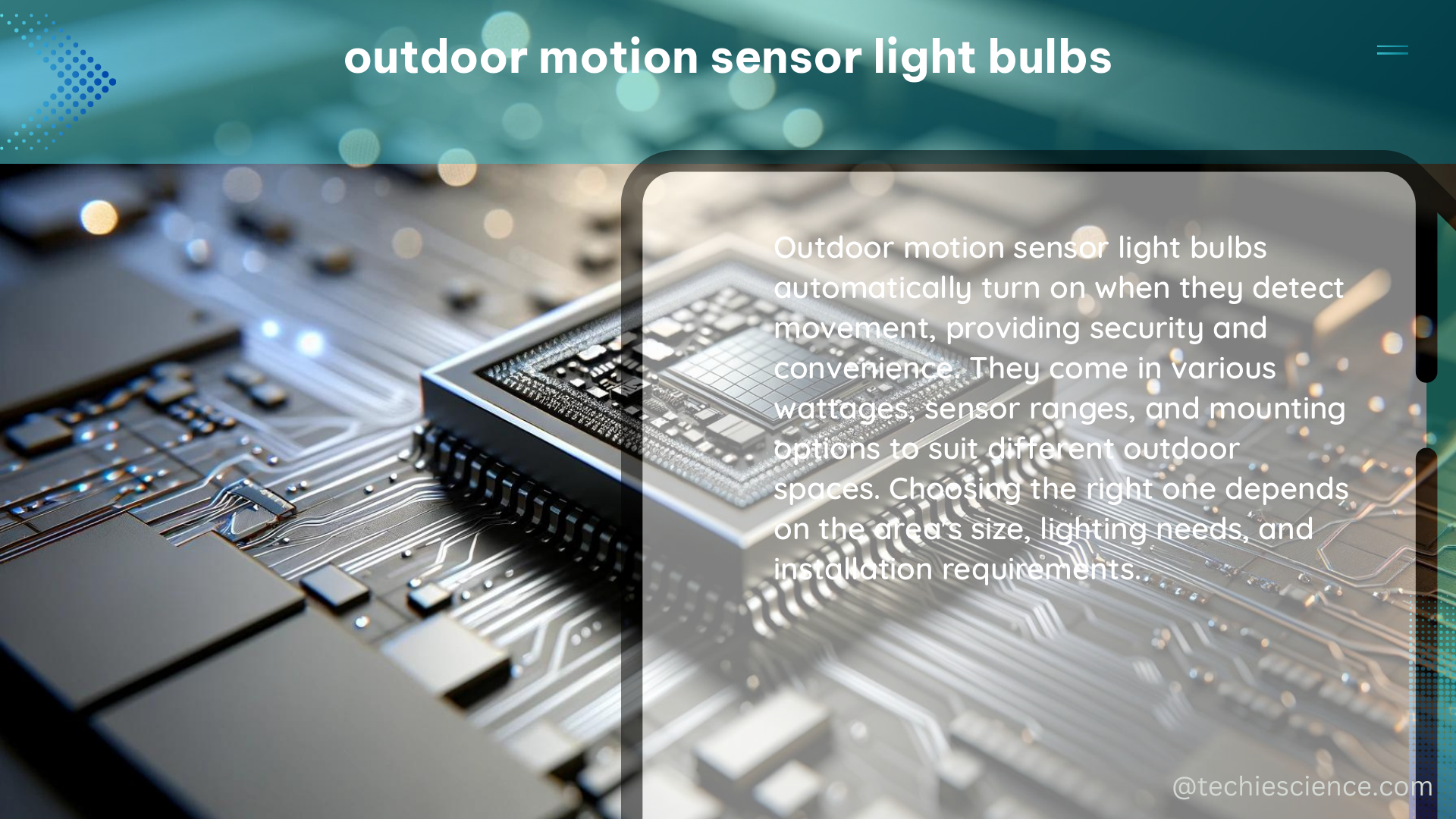Outdoor motion sensor light bulbs are an excellent addition to any home or business, providing enhanced security, energy efficiency, and convenience. These versatile lighting solutions automatically illuminate when motion is detected, ensuring your property is well-lit and deterring potential intruders. When selecting the right outdoor motion sensor light bulb, it’s crucial to consider various technical specifications, including light sensor units, lumens, lux, and candela.
Understanding Light Sensor Units
Light sensor units are the foundation of how motion sensor light bulbs function. The most common units used to measure light are:
- Candela (cd): The base unit used to describe luminous intensity, which is the measure of how strong light appears to the human eye.
- Lumens (lm): A measure of the total luminous flux or the total amount of light emitted by a source.
- Lux (lx): A measure of the illuminance or brightness of light, where one lux is equal to one lumen per square meter.
For example, the TORKASE motion sensor light bulb provides 1100 lumens of brightness, equivalent to a 100W traditional bulb, and lasts for 20,000 hours, saving up to 85% on energy consumption.
Highly-Accurate Light Sensors

The enDAQ sensor’s light sensor utilizes an Si1133 photodiode to log illuminance data on the device, along with acceleration, temperature, and pressure data. The Si1133 measures the infrared light separately and uses it to properly adjust the illuminance data. Additionally, the enDAQ sensor’s light sensor can measure the UV index in addition to visible light, providing a comprehensive understanding of the lighting conditions.
Variety of Outdoor Motion Sensor Light Bulb Options
When it comes to outdoor motion sensor light bulbs, there is a wide range of options available, from basic components to highly-accurate data loggers. The enDAQ sensor’s light sensor, for instance, is a highly-accurate data logger that can be used to measure illuminance data in various locations, including:
- Staircases
- Hallways
- Bathrooms
- Front doors
- Storage rooms
- Garages
- Porches
- Closets
- Balconies
- Gates
Installation and Placement Considerations
In addition to technical specifications, it’s essential to consider the installation and placement of outdoor motion sensor light bulbs to ensure optimal performance. For the TORKASE motion sensor light bulb, it should be mounted 8-15 feet above the ground, and the motion sensor part must be exposed outside. It’s also crucial to ensure that the head of the bulb is facing the sensing area within the proper distance and angle, and that the switch is always on.
Compatibility with LED Bulbs
When using outdoor motion sensor light bulbs, it’s important to note that LED bulbs may not work correctly with older motion sensors, causing them to flicker or blink at a steady frequency. This is because LED bulbs require less power to light up, and older motion sensors may provide too much power, causing the LED bulbs to flicker. To fix this issue, it’s recommended to install incandescent or halogen bulbs or replace the fixture so it’s compatible with LED bulbs.
Conclusion
Outdoor motion sensor light bulbs are a versatile and efficient solution for enhancing the security, energy usage, and convenience of any home or business. By understanding the technical specifications, such as light sensor units, lumens, lux, and candela, as well as the installation and placement considerations, you can select the right outdoor motion sensor light bulb to meet your specific needs. Additionally, ensuring compatibility with LED bulbs can help you avoid any flickering or blinking issues. With the right outdoor motion sensor light bulb, you can enjoy a well-lit and secure outdoor space.
References:
– How Light Sensors Work
– TORKASE Motion Sensor Light Bulb
– Troubleshooting LED Bulbs with Older Motion Sensors

The lambdageeks.com Core SME Team is a group of experienced subject matter experts from diverse scientific and technical fields including Physics, Chemistry, Technology,Electronics & Electrical Engineering, Automotive, Mechanical Engineering. Our team collaborates to create high-quality, well-researched articles on a wide range of science and technology topics for the lambdageeks.com website.
All Our Senior SME are having more than 7 Years of experience in the respective fields . They are either Working Industry Professionals or assocaited With different Universities. Refer Our Authors Page to get to know About our Core SMEs.